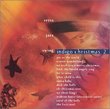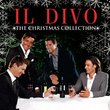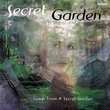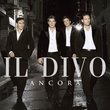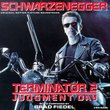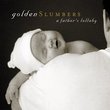| All Artists: Mozart, Roswaenge, Lemnitz, Husch, Beecham Title: Mozart: Die Zauberflöte (The Magic Flute) Members Wishing: 0 Total Copies: 0 Label: Naxos Original Release Date: 1/1/1937 Re-Release Date: 3/6/2001 Genre: Classical Styles: Opera & Classical Vocal, Historical Periods, Classical (c.1770-1830), Modern, 20th, & 21st Century Number of Discs: 2 SwapaCD Credits: 2 UPC: 636943112724 |
Search - Mozart, Roswaenge, Lemnitz :: Mozart: Die Zauberflöte (The Magic Flute)
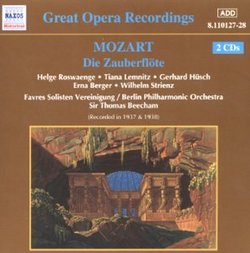 | Mozart, Roswaenge, Lemnitz Mozart: Die Zauberflöte (The Magic Flute) Genre: Classical
|
Larger Image |
CD DetailsSimilarly Requested CDs
|
CD ReviewsHas any opera recording been reissued more times than this? John Austin | Kangaroo Ground, Australia | 11/01/2001 (4 out of 5 stars) "This famous recording, now more than sixty years old, must have been reissued more times than any other recorded version of any opera. Is this due to the incomparable Beecham magic? I heard one famous conductor, who recorded the opera himself, say that he didn't fully discern the particular pulse, nor the mixture of gravity and sparkle in the music until he listened to this Beecham recording. Those who know and have lived with this recording will need no urging to enjoy this inexpensive and preferred new transfer. To others, looking perhaps for a first purchase of a great Mozart opera, I should provide a few cautions. Firstly, no spoken dialogue is included. Secondly, the sound quality, even for a studio recording in the period 1937-1938, is often poor and never more than passable. The beautiful music for the three "ladies" and the three "boys" fares particularly badly, and no modern transfer has been able to clarify it. Thirdly, the political situation existing in Berlin at the time meant that several of the singers selected by Beecham - Richard Tauber as Tamino, Alexander Kipnis as Sarastro, and Herbert Janssen as the Speaker - could not risk their lives by accepting. Their replacements, or a least two of them, are not impressive as regards style and steadiness. Erna Berger's Queen of the Night somehow posed no problem for the recording equipment. A long-kept secret was the fact that the take to be finally selected of her first aria was made in Beecham's absence. Music lovers have always ranked highly the singing of Gerhard Hüsch as Papageno. I sometimes wonder, however, whether the opera's librettist and first Papageno, Emanuel Schikaneder, ever intended that this bird catcher looking for a mate should sound like an aristocrat. In short, there is much here that no one should miss hearing, but some inadequacies are to be expected." Famous and historic recording L. E. Cantrell | Vancouver, British Columbia Canada | 01/19/2006 (5 out of 5 stars) "Save for the fact that I think the Papageno is just fine, I heartily agree with Mr. Austin's comments. For many years, this was the only available near-complete recording of "Die Zauberfloete," and it is still the definitive recorded version in the minds of many older fans. Because it was issued on 78-rpm records that played for a bit over three minutes apiece, the complete opera would have required about forty sides, or more than twenty records, all to be sold in bound albums of five records each. Just lifting such a thing would be an effort, let alone paying for it. As a strictly practical and commercial decision, Walter Legge, the producer, decided to forgo recording the spoken dialogue. The cast was a very strong one for the time--and for ours, too--but it was not entirely the cast that Beecham and Legge had originally planned, as Mr. Austin has explained. Even so, Beecham's overall concept remains as brilliant today as it was almost seventy years ago. The recorded singers are as good as any today, but it should be noted that they reflect a different performing style from our present one. Helge Rosvaenge, for instance, had a much heavier voice than the typical Tamino of today, and he was associated with operatic roles that our current Taminos could never touch. The Queen of the Night, Erna Berger, sounds like nobody singing today--trust me on that! She is stupendous, nevertheless. While I can't recommend this famous and venerable set to anyone as a first or only "Zauberfloete" because of its unimpressive sound reproduction and its lack of dialogue, I strongly urge it as everyone's second set. Five stars for historic importance and performance quality." For students of early 20th century performance practices Philip S. Griffey | Bainbridge I. WA USA | 07/06/2008 (2 out of 5 stars) "Unless you are a particular fan of one of these singers, or are interested in studying the early 20th century performance practices for Mozart opera, there is really no reason to get this recording. The recorded sound is excellent for the 1930's, which is to say limited in range and dense in texture. Beecham, usually an insightful and elegant Mozart conductor, tends toward the slow and reverential here. There is no dialog included, and the singing style and voices of most of the principal singers are not well suited for their roles.
Helge Rosvaenge (Tamino) was never an elegant singer. In Verdi and in verismo roles, he could sing with vigor and elan. Here he sounds awkward and un-princely. Erna Berger (The Queen of the Night) was a very stylish singer in soubrette roles (Zerlina, Norina, Gilda), but her voice had a very girlish quality totally unsuited for the menacing and vengeful Queen. Tiana Lemnitz was a wonderful singer, one of the greatest sopranos ever recorded; but her forte was the romantic heroines (Desdemona, Aida, Leonore and especially Agathe in Freischutz). As Pamina she sounds uncomfortable and unsteady. Gerhard Husch, as Papageno, has a warm, pleasant voice, which he uses to excellent effect. One of the best recorded bird catchers. Wilhelm Strienz, uses his deep and sonorous voice to give us an above average Sarastro. If you want a good romantic rendition, in modern sound, and better suited singers, look to Klemperer or Boehm (1955 or the 1964 with Wunderlich.). If you want a fleet, historically informed Magic Flute in modern sound, look to Gardiner, Norrington (very fast) or Christie (not so fast). If you want a good, modern "not too romantic, not too historically informed" but very fine recording, try Abbado's. " |

 Track Listings (18) - Disc #1
Track Listings (18) - Disc #1